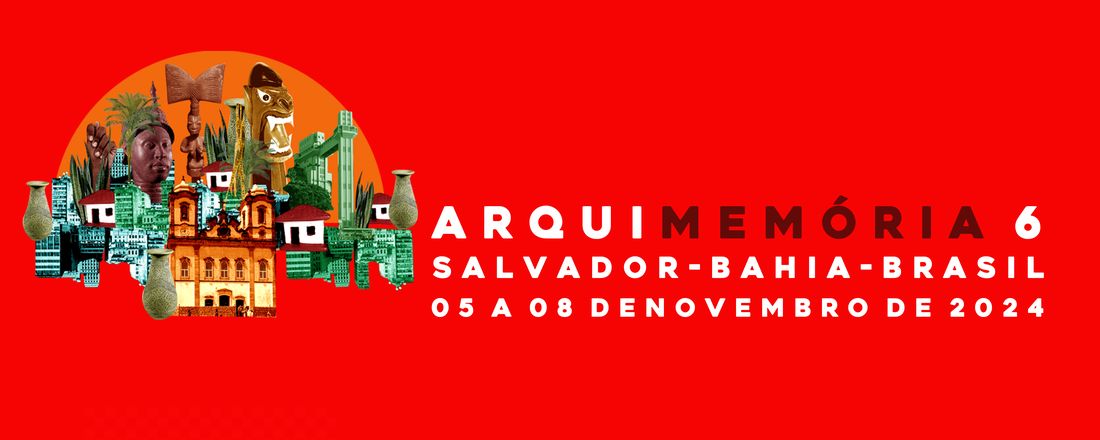ArquiMemória 6 – International Meeting on Conservation of Built Heritage is, unquestionably, the largest and most important forum for debate on the preservation of the built heritage in Brazil. Around 800 professionals working in the most diverse areas: professors, students and researchers from renowned Brazilian and foreign universities; officers and technicians public agencies for the conservation of the cultural heritage and urban planning and development from all over Brazil and abroad; professionals working in the areas of design and restoration works; etc.
The event is jointly organized by the Institute of Architects of Brazil, through of the Department of Bahia (IAB-BA) and the Faculty of Architecture of the Federal University of Bahia (FAUFBA), through the Postgraduate Program in Architecture and Urbanism (PPG-AU) and the Professional Master's Degree in Conservation and Restoration of Monuments and Historical Centers (MP-CECRE) and will take place in Salvador, Bahia, between November 05 and 08, 2024.
In this 6th edition the theme is: Democracy, diversity and reconstruction.
The deepening of the debate, in all fields of knowledge, on democracy, human rights and respect for diversity in its multiple expressions has never been more urgent than today. As a result of a fundamentally social and political construction, the field of memory and heritage preservation cannot avoid this debate, and must even face it with the centrality that the global context and the growing threats to democracy, institutions and human rights, posed by the rise of an authoritarian and autocratic extreme right and by armed conflicts such as those plaguing Ukraine, Sudan and Palestine, request.
In addition to these threats, memory and heritage cannot currently be thought of, in their selection, recognition and management processes, without considering the demands and claims posed by social, ethnic, racial and gender issues that mobilize societies around the world, as well as the impacts caused by climate change and ecological imbalances.
The Institute of Architects of Brazil (IAB), through the Department of Bahia (IAB-BA), and the Faculty of Architecture of the Federal University of Bahia (FAUFBA), through the Postgraduate Program in Architecture and Urbanism (PPG-AU ) and the Professional Master's Degree in Conservation and Restoration of Monuments and Historical Centers (MP-CECRE), propose that ArquiMemória adopts democracy and diversity as its central theme for this sixth edition, associated with the idea of reconstruction – in its most diverse meanings – as possibility of rescuing and strengthening cultural assets, both tangible and intangible, destroyed, compromised or weakened by warlike actions and policies of an anti-democratic and anti-social nature, as well as by natural disasters, such as the flooding of São Luís do Paraitinga, in the State of São Paulo; fires such as those at the National Museum, in Rio de Janeiro, and the Notre-Dame de Paris cathedral; and announced tragedies, such as the ruptures of the Brumadinho and Mariana dams, in Minas Gerais, with immense impacts on cultural and natural heritage. It is, therefore, a broad call to reflect on the contemporary role of memory and heritage policies as means of strengthening democracy, cultural diversity, social justice and solidarity between peoples.
In the year which the 60th anniversary of the Venice Charter and the 30th anniversary of the Nara Conference on authenticity are celebrated, ArquiMemória 6 also proposes to promote reflections on the relevance of these documents that supported the look at the heritage built in recent decades, as well as its applicability in the most diverse cultural contexts today.
Axis 1 – Heritage, democracy and
human rights
Dictatorships and memory spaces.
Sensitive heritage preservation.
Social participation and safeguarding the
cultural heritage.
Community initiatives to preserve memory and heritage.
Construction, reconstruction and
transformations of cultural policies and institutions.
Heritage and right to the city
Industrial heritage and the world of
work.
Heritage, tourism and their tensions.
Public policies and heritage management.
Axis 2 – Heritage, society and
diversity
Heritage and cultural identities.
Heritage and gender issues.
Heritage and ethnic-racial issues.
Heritage, native peoples and African diaspora.
Reconstruction in its various
meanings.
Heritage, memory and reconstruction.
Construction of the built heritage
after natural and environmental disasters, conflicts and wars.
Cultural identities and reconstruction
Axis 3 – Heritage knowledge
Traditional knowledge in built heritage and its transmission.
Technologies for preserving built heritage.
Techniques
conservation and restoration for built heritage.
New
technologies in the documentation and conservation of built heritage.
The importance of collections and their preservation.
Axis 4 – Reflections on heritage
Reflections and theory of conservation and
restoration of built heritage.
History of heritage, conservation and restoration of built heritage.
Circulation of ideas and criticism of intervention and restoration projects for built heritage. Criticism, valuation and recognition of the heritage character of the built collection.
Special Axis – 60 years of the Venice Charter and 30 years of the Nara Conference
Global reception, theoretical reflections and
practical applications of the ideas of the Venice Charter and the Nara Conference.
The
Venice Charter, the Nara Conference and other heritage charters.
Timeliness of the Venice Charter and the Nara Conference in the face of contemporary challenges.




